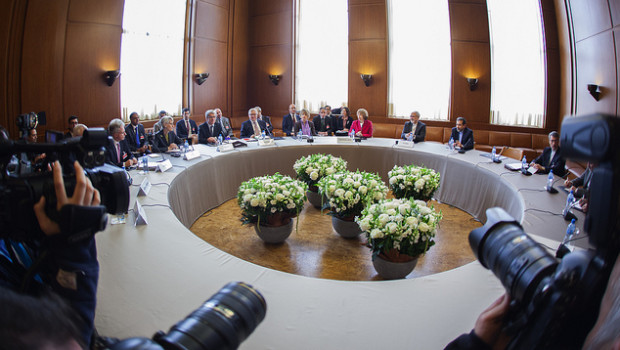The Iranian Deal: An Auspicious Beginning, but Nothing More
The deal brokered in the wee hours of Sunday morning by the P5+1 to temporarily halt Iran’s nuclear program provides an auspicious base from which future lasting accords can be structured. The deal, though still unsuccessful in allying fears from legitimately concerned leadership in Israel, Saudi Arabia and similarly minded Gulf States, is unprecedented in nature and unique in that it supplants mere hopes of change with verifiable measures to be taken by Tehran. In addition to halting the enrichment of uranium beyond 5% percent, Iranian leadership has pledged to deactivate existing links between networks of centrifuges and desist from installing new networks of centrifuges. Tehran has also promised, via its foreign minister Javad Zarif, not to open or construct new nuclear enrichment facilities or put into operation its much maligned heavy water reactor, which, if active, would furnish an additional source, plutonium, through which Iran could develop a nuclear weapon.

The deal, though noteworthy and certainly a victory for champions of diplomacy, has shown itself ineffective in mollifying existing concerns which have been incessantly reiterated by inveterate hardliners in, above all, Israel and Saudi Arabia. These fears are not unfounded, and express legitimate concerns, the first which is related to Iran’s existing nuclear framework. Though any new enrichment and construction of new facilities have been sworn off by senior Iranian leadership, existing stockpiles of previously enriched uranium, as well as the facilities in which they have been enriched, still exist. Similarly, leaders in both countries have highlighted the fact that existing stockpiles of centrifuges, already increasing in number, will not be destroyed or dismantled, thereby allowing Iran the ability to continue to enrich uranium to break-out capacity should the current deal fall through. Israeli Prime Minister Benjamin Netanyahu, the foremost opponent of an Iranian nuclear deal, has explicitly stated that any deal that does not completely remove a seemingly burgeoning Iranian nuclear program can only open the door for a repeat of the events in North Korea, where a deal to rein in its nuclear program was negotiated, but ultimately proved ineffective when North Korea broke out in 2006.
Distrust and pre-existing fears wrought by years of chicanery and underhandedness on both sides must not, however, derail a potentially groundbreaking, permanent deal that ultimately improves safety throughout the Middle East by providing concrete evidence that Iran does not seek to develop nuclear weapon technology. Similar concerns over being too obsequious with Iran should also be eased following confirmation that the West has committed to returning frozen assets, and will allow existing sanctions to stand in the interim. The P5+1 must now dedicate the next six months to the goal of establishing a lasting solution to a unique problem. Instead of comparing the Iranian question to other regimes such as those of North Korea and Libya, it will be wise for negotiators to approach the situation cautiously while bearing in mind the degree of pride with which the nuclear program is regarded within Iran, and the vehemence with which an overtly one-sided deal will be rejected.
The deal brokered in Tehran should be celebrated for what it is, but nothing more. The time period of six months provided by the existing deal should be approached as merely an opportunity to enact a deal whose primary focus must be lasting security and stability in the Middle East. Any deal that does not go beyond the status quo and achieve something truly noteworthy must, irrespective of intentions, be viewed as an abject failure.
Eric Wheeler